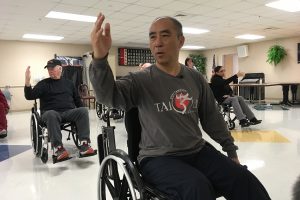Email Sign-Up
Subscribe to KHN’s free Morning Briefing.
Sign Up
Please confirm your email address below:
Sign Up

Zarita Croney, a veteran with the National Guard, said tai chi has helped her, too, with chemical dependence. She now makes the nearly-two-hour drive from Hopkinsville, Ky., to Murfreesboro each week, and has reduced her use of opioids for pain..
“My whole life … revolved around, ‘Oh shoot, when can I take my next pill? When can I take my next pill?’” Croney recalled. “I’ve gone from about 90 percent of my day being on my bed to being able to come out and be social.”
The Department of Veterans Affairs has been aggressively trying to wean vets from reliance on strong narcotics — partly by using prescription data as a key measurement to judge VA hospitals across the country — while trying to make sure alternatives don’t cause their own harmful side effects.
The VA acknowledges that there’s very little evidence at this point that tai chi or mindfulness therapy or acupuncture will do any good for PTSD or addiction, though recently there has been research into the quality of life benefits of tai chi among the older adults.
But these alternative therapies have been in use by the department long enough that the VA aims to more closely track the treatments’ effectiveness. It is especially targeting people for alternative treatment who have only recently completed their military service.
The goal, proponents say, is to have veterans incorporate these techniques into their weekly routine, not just rely on a drug prescription to ease pain or anxiety.
“Whole health, along with how many opiates are being prescribed — we’re going to look at how does this impact that,” said Aaron Grobengieser, who oversees alternative medicine for VA hospitals in Tennessee.
“I believe this is going to be an avenue,” he said, “to really help address that group of folks that are really looking for ways to manage those types of conditions without popping another pill.”
This story is part of a partnership that includes Nashville Public Radio, NPR and Kaiser Health News.
